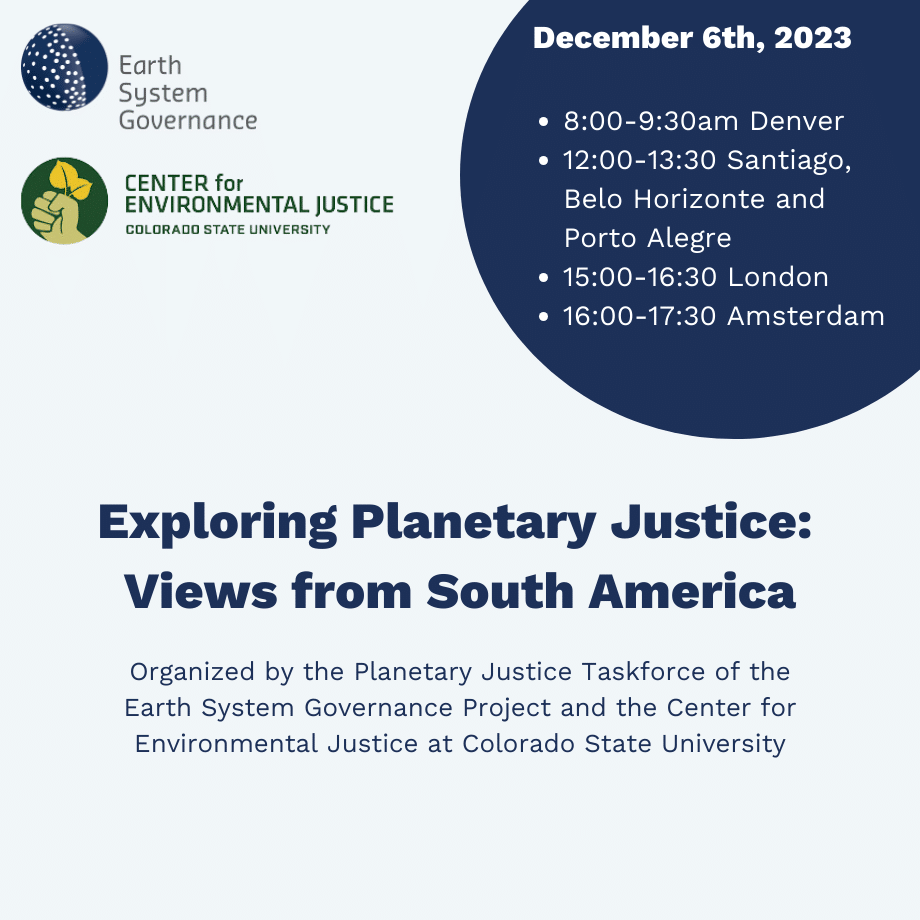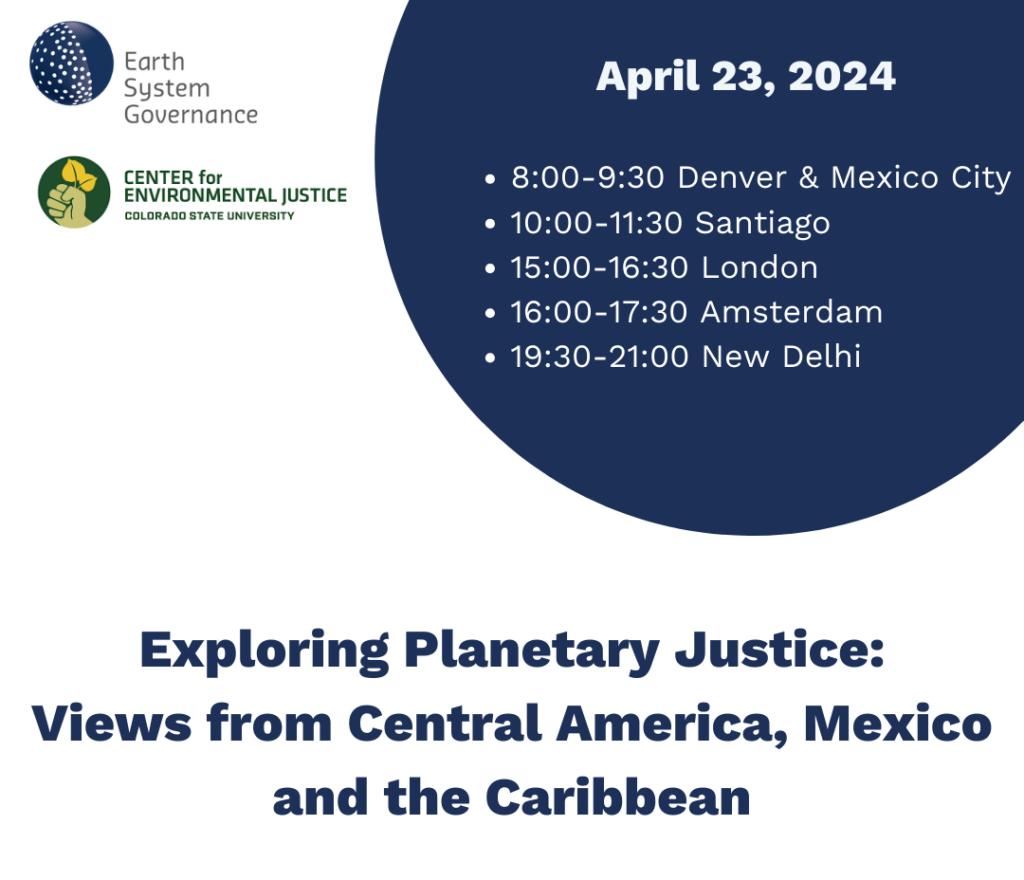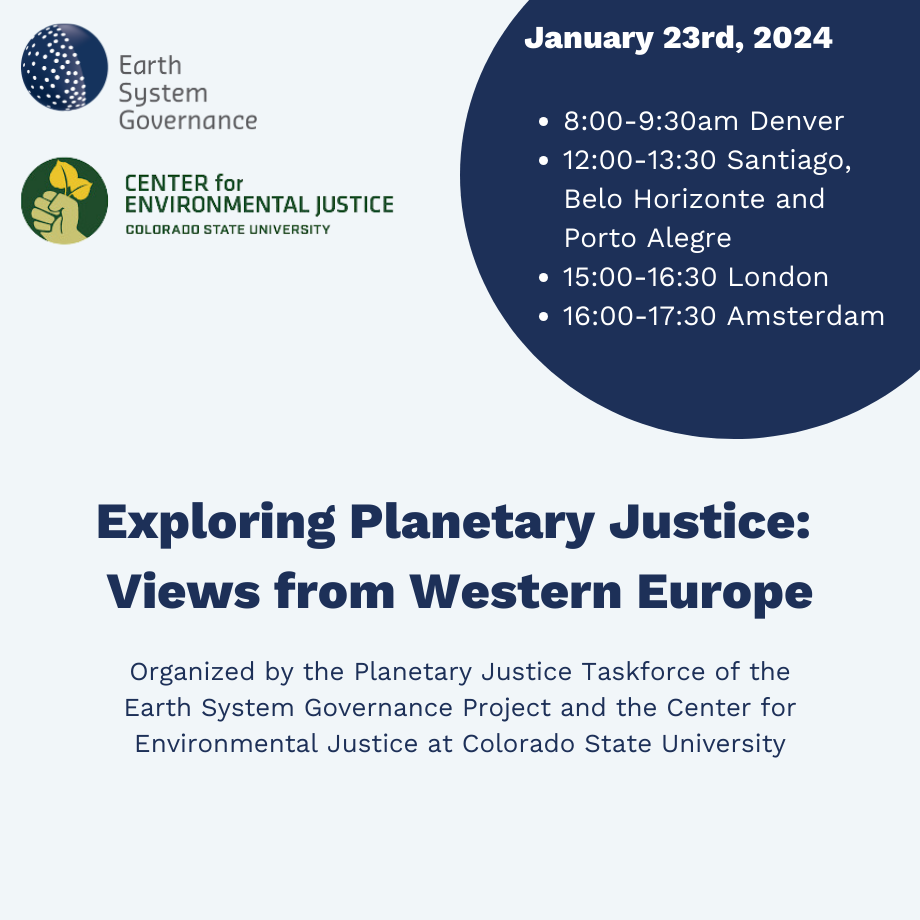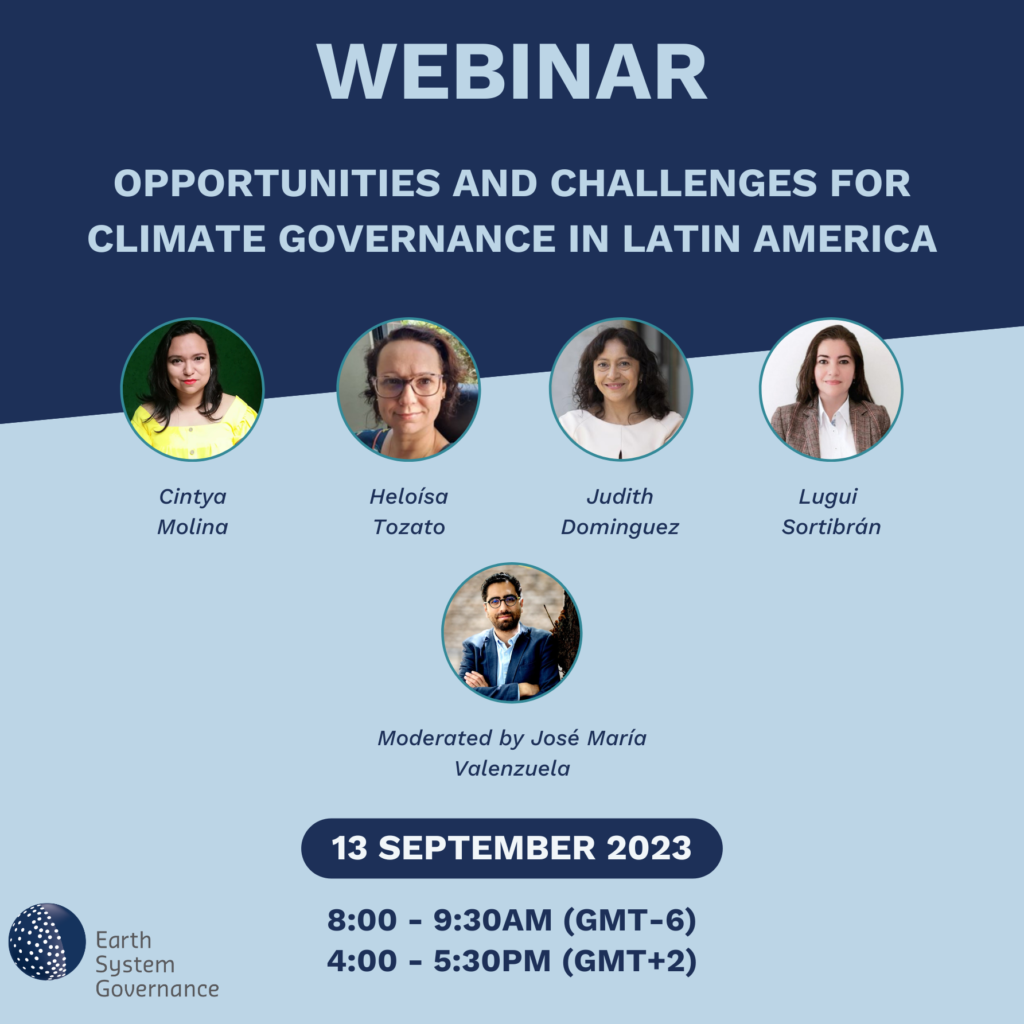On Wednesday, December 6th, 2023, (8:00 to 9:30 am Denver time, 12:00 to 13:30 pm Santiago time, and 16:00 to 17:30 pm Amsterdam time) a webinar on Exploring Planetary Justice: Views from South America will be held.
This webinar series is co-convened by Agni Kalfagianni, Stefan Pedersen, and Dimitris Stevis, and organized by the Planetary Justice Taskforce of the Earth System Governance Project and the Center for Environmental Justice at Colorado State University
Registration link and more information available below.
General Description
Intersecting social and environmental challenges are affecting and endangering the human and non-human realms on earth. This has intensified demands for justice, with some scholars proposing the concept of ‘planetary justice’. However, what exactly planetary justice means and whether this resonates with existing scholarship and practice of justice, especially in the ecosocial sense, is currently underexplored.
This joint initiative between the Earth System Governance project and the Center for Environmental Justice of Colorado State University aims at establishing an international network of researchers who are interested in exploring the place of planetary justice within their thinking and practice on ecosocial justice. For this reason we are conducting a series of webinars across different world regions under the title ‘Exploring Planetary Justice’. Participants are invited to address three main prompts drawing on their own research and experiences, which we will compare and synthesize at the end of the webinar series. In this first webinar we focus on South America.
Moderator:
- Andrea Baudoin-Farah, Colorado State University, USA
Panelists:
- Joel Correia, Colorado State University, USA
- Verônica Korber Gonçalves, Federal University of Rio Grande do Sul, Brazil
- Grettel Navas, University of Chile
- Iokiñe Rodríguez, University of East Anglia, UK
- Andrea Zhouri, Federal University of Minas Gerais, Brazil
This will be a 90-minute event with 60 minutes for panelist comments on the below prompts, and 30 minutes for questions and discussion.
Prompts
1. What do you see as the major theoretical and political tendencies within ecosocial justice in your region?
2. What are the forces for or against ecosocial justice in your region, in addition to the global or planetary levels?
3. Has the concept of Planetary Justice or something similar found its way into your region? How? What does Planetary Justice mean to you?
Andrea Baudoin-Farah is an Assistant Professor at the Ecosystem Science and Sustainability Department at Colorado State University. She originally trained as an agronomist within the agrarian systems and compared the agriculture school of thought in France (AgroParisTech). In her early career, she worked with different organizations in Bolivia and South America on food security and sustainable livelihoods. She then went on to pursue a PhD in interdisciplinary ecology at the University of Florida, exploring meanings of indigenous autonomy in the Bolivian Amazon. She has multiple research interests around questions of change and transformation of socioecological systems in rural and indigenous lands. The geographic focus of her work has mostly been the Andes-Amazon. Her current research, a continuation of her postdoctoral work with the Natural Capital project at Stanford University, explores the impacts of land use change and climate change on livelihoods and ecosystem services in the Llanos de Moxos wetland complex in the Bolivian Amazon, a biocultural landscape increasingly connected to global commodity chains.
Veronica Korber Gonçalves is a professor in the Department of Economics and International Relations at the Federal University of Rio Grande do Sul (UFRGS), and currently, she is at the Institute of International Relations at the University of Brasília. Her research relates to indigenous land rights in the Amazon in the 21st century, forest carbon credits, and global climate change governance. For that, she focuses on justice and allocation, considering the contextual conditions of inequality and diversity in the region. Her latest publications are: ‘Brazilian anti-indigenous politics: tracking changes on indigenous rights regulation during Bolsonaro’s government‘; “Carbon offset from the Amazon forest to compensate aviation emissions: Global solution, local struggles“; and “Amazônia no século XXI : temas de estudos estratégicos internacionais.“
Grettel Navas is a political ecologist working on toxic pollution, public policy and environmental justice. She is assistant professor at the Department of Political Studies at the School of government, University of Chile & Associate Lecturer of the interdisciplinary Master’s Degree in Planetary Health from the Universitat Oberta de Catalunya (UOC). Grettel completed her PhD at the Autonomous University of Barcelona being part of the ENVJustice project. She holds a Master Degree in Socio- Environmental Studies (FLACSO- Ecuador) and a Bachelor Degree in International Relations (National University of Costa Rica). She is an active member of the Latin American Political Ecology Group (CLACSO-Abya Yala) and part of the Direction and Coordination Group of the global Environmental Justice Atlas (EJAtlas) that documents environmental conflicts and resistance movements worldwide.
Joel Correia is a human-environment geographer who investigates how landscape change and natural resource governance shape societal inequalities manifest as climate and environmental injustice among Indigenous and front-line communities in Latin America. He studies the uneven effects of development-driven environmental change, particularly the destruction of South America’s largest forests — the Amazon and the Gran Chaco — and social responses to that change. Correia’s research currently studies Indigenous territorial management and land rights, the implementation of Inter-American Court of Human Rights decisions, legacies of settler colonialism, expanding agrarian frontiers, political ecologies of infrastructure, and relationships between biocultural diversity, climate change mitigation, and community-led conservation. His work is rooted in qualitative social science and public political ecology but transgresses disciplinary boundaries through diverse mixed-methods and engaged in-situ research with front-line communities, human rights advocates, policy makers, and scientists. His first book, Disrupting the Patrón: Indigenous Land Rights and the Fight for Environmental Justice in Paraguay’s Chaco, was published with University of California Press and is available open access. Correia is an assistant professor at Colorado State University in the Human Dimensions of Natural Resources Department where he is also co-director of the Just Social-Ecological Transitions in Latin America Program and principal investigator for the Climate and Environmental Justice Futures Collaborative.
Andréa Zhouri holds a degree in Social Sciences from the Federal University of Minas Gerais (1984), a Master’s in Social Anthropology from the State University of Campinas (1992) and a PhD in Sociology from the University of Essex, England (1998). She is currently a full professor at the Federal University of Minas Gerais, Brazil, where she created the Group of Environmental Studies (GESTA) as well as the undergraduate course in Socio-Environmental Sciences with colleagues from different departments. Her research interests have been developed under a Political Ecology perspective with themes like Socio-Environmental Conflicts, Environmental Justice, Large Projects such as Mining, Hydroelectric Dams and Disasters. She has been an active member of several scientific associations and is currently the president of the Brazilian Association of Anthropology (2023-2024). Zhouri was a fellow of the desiguALdade.net project of the Iberoamerican Institute of Berlin together with the Latin American Institute of the Free University of Berlin (December 2013) and held a CAPES Senior Research Fellowship at FU Berlin and Universität Kassel, Germany in 2017. She is a CNPq (National Council of Development and Technology) researcher and has published several articles and books about mining, large dams, environmental conflicts, and deregulation in Brazil. Some of her recent publications in English are: From ‘participation’ to ‘negotiation’: suppressing dissent in environmental conflict resolution in Brazil; Dossier Mining, Violence and Resistance; Laschefski & Zhouri, Indigenous peoples, traditional communities, and the environment: the ‘territorial question’ under the new developmentalist agenda in Brazil; Zhouri &Vasconcelos, From the muddy banks of the Watu: The Krenak and the Rio Doce mining disaster in Brazil.
Iokiñe Rodríguez is an Associate Professor from the School of International Development (DEV) at the University of East Anglia (UEA) in the UK and part of DEV’s Global Environmental Justice Group. She trained as a sociologist in Venezuela, and uses local environmental knowledge and participatory action-research to help transform environmental conflicts and achieve environmental justice from a decolonial perspective. Her work on environmental conflict transformation focuses on issues of local history, local knowledge, cultural revitalization, power, equity and intercultural dialogue. She has worked building local and institutional capacity to transform environmental conflicts in Venezuela, Guyana, Ecuador, Chile, Bolivia and Colombia. She is co-editor of a new Pluto Press publication “Just Transformations: grassroots struggles for alternative futures” that looks at how societies can be transformed in the interests of environmental justice from the ground up.









